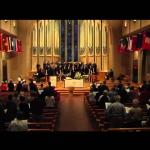Well, my planned trip to Columbus, Ohio ended up being scrapped Friday night; the flight was cancelled because of thunderstorms, and I was unable to reschedule it for Saturday morning. I wasn’t really prepared to preach anything this weekend—and nobody was expecting me to preach, anyway, since I was supposed to be out of town. But this morning, following the Boy Scout motto (and the advice I give to my homily students), I decided it best to “Be Prepared.” Over my morning coffee, I dug around in the vault and found a homily from six years ago, addressing the same readings. I rewrote about a third of it. (If I’d given it more time, I’m sure it would have turned out better. But you do what you can.) And, sure enough, one of the priests when he saw me this morning said, “You wanna preach?”What you see below is the result. I ended up delivering this twice.
+
Last weekend, our country was shaken. And angered. And wounded. And the wounds this morning are still deep.
We’ve spent much of the last week trying to process what happened in Charlottesville, and why. What are we supposed to learn from these tragic events?
This weekend, unexpectedly, God gives us an answer—one of reconciliation and hope.
The Gospel we just heard offers us startling lesson – an idea that we need to hear, especially now, especially in this country, at this moment.
The message is this: God doesn’t just love those who are like us.
God doesn’t just love those who are like us.
What this Gospel tells us is that God’s mercy extends to those who are different from us, to those whom we might even consider to be our enemy, even to those we might hate or who might hate us.
To our amazement, sometimes, those enemies may even have a deeper faith than we do – the kind of conviction that can bring about miracles.
Certainly, the Jews considered Canaanites an enemy. You can hear the scorn when the disciples tried to shoo the Canaanite woman away.
It’s important for us to remember here that Matthew was a Jew writing for other Jews – and that the words of Jesus and his apostles echoed the prevailing sentiment of Matthew’s audience.
So, that audience would have been surprised to learn that the Son of David worked a miracle for someone many of them had been taught to hate.
More than surprised: they would have been stunned.
But Jesus was constantly upsetting the status quo, and forcing people to think differently about themselves, and those around them. And here he does it again. Faith, we learn, can astonish us. Miracles can happen. God’s vision is so much greater than ours.
As an old hymn puts it, “There is a wideness in God’s mercy.” It is available to all.
In the first reading, from Isaiah, we heard of how God embraces those “foreigners who join themselves to the Lord…” and the passage concludes with the beautiful words that are inscribed in the National Cathedral in Washington, DC: “My house shall be called a house of prayer for all peoples.”
Then we sang the responsorial psalm and made that idea our own prayer: “Lord, let all the peoples praise you!”
And then we heard from Paul, writing to the Romans, and he even celebrated the fact that he was an apostle to the Gentiles, one sent to those outside his own circle of belief.
“There is a wideness in God’s mercy.”
The sorrowful and tragic and hate-filled events of last weekend—and the wounds that they opened within our country— challenge us to ask ourselves:
How wide is our mercy?
Is it wide enough to embrace people not only of other colors, but other religions, other ideologies, other political parties?
Is it wide enough to include, even, people who hate? Are we Christian enough to love even them?
The readings remind us: Those who may seem to be outside our circle aren’t necessarily outside the circle of God. His circle is limitless. And there is always room for more.
What a comfort! All of us, at one time or another, have been “outside the circle.” All of us have felt like foreigners: isolated, uncomfortable, like we don’t belong. Remember that first day at a new school? The first hours in a new job? Or even the first months in a new country?
God never forgets it. And he extends his hand to us, and to everyone seeking to be a part of His circle. Are we willing to take what He has to offer? Are we willing to “join ourselves to the Lord”? Are we ready, like the Canaanite woman, to dare to believe what others would find unbelievable?
And: mindful of this gospel, are we willing to extend to others the same kind of mercy that God extends to us?
Yesterday, my friend Leticia Adams published an essay online that put this so beautifully:
“My Catholic faith, which is rooted in a relationship with the living God, requires me to respect the dignity of all human beings. In simplest terms, it means that, while I get to call out evil behavior for what it is, I do not get to relish the thought of punching these people in the face. I don’t get to call them names, or gleefully enjoy it when others do. The only option for me is to recognize the evil acts as evil, fight for justice, and pray for the conversion and redemption of those people carrying nazi flags, because Christ hung on a cross for them just as much as he did for me.”
Can we accept this? Are we willing to love those we’ve been taught to despise?
They may be more like us than we realize.
And they are, like all of us, works in progress. As a conservative friend of mine used to say all the time about Barack Obama, with words that could apply to the present occupant of the White House: “God isn’t finished with him yet.”
The fact is, he isn’t finished with any of us yet.
Just 10 days ago, we celebrated the feast of St. Teresa Benedicta, better known as Edith Stein. Born Jewish, she became an atheist – completely rejecting God — before converting to Catholicism, joining a convent, and then losing her life in a Nazi death camp. At any given moment, she would have been considered “outside the circle.” Not a Christian, then not a Jew, then not a believer.
But she was never beyond God’s circle of grace. All it took was her own yearning, her seeking – her desire, like the Canaanite woman, to have God work a miracle in her life.
This morning, as we gather around this table for communion – people of every race, from every country, from every region – we gather literally in communion, bound by our love of the Lord and our hunger for the Eucharist, our own yearning to be a part of this miracle.
Pray for those who may not be here yet – but who may be on their way. Because God doesn’t just love those who are like us.
This Sunday, in a special way, pray for those who carry hate in their hearts for one reason or another. We may know them. We may live with them. We may even sometimes be them. But God loves them, and loves us, anyway.
There is a wideness in God’s mercy.
I was thinking this morning of the father of the woman who was killed last weekend in Charlottesville. In the middle of his grief, he managed to find grace. “I can only think of Jesus on the cross,” he said. “Father, forgive them, they don’t know what they’re doing.”
Pray that we may be as merciful to one another as God is to us — because God isn’t finished with any of us yet.












